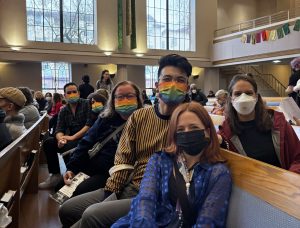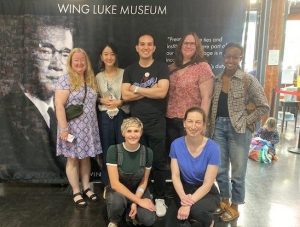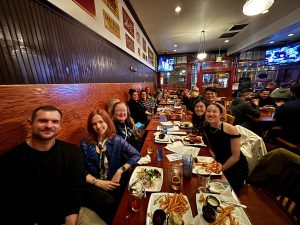The University of Washington Psychiatry Residency is committed to recruiting, supporting, and retaining a diverse cohort of physicians to provide equitable care to an increasingly diverse patient population.

Antiracism Committee
The Antiracism Committee is composed of residents, fellows, and faculty who meet monthly. Meetings are open to any resident, fellow, and faculty who would like to attend.
Members self-select into subcommittees that are determined yearly based on residency needs. Subcommittees have completed projects such as creating curricular resources, designing and implementing faculty development training, and surveying the current residency climate. The committee also participates in voluntary field trips within the community, such as the Transgender Day of Remembrance Concert, a visit to the Wing Luke Museum, and the Wa Na Wari Walk the Block event.
Learn more about our ongoing efforts in this summary of our EDI Initiatives.
Mission Statement

The field of psychiatry has been complicit in supporting racist institutions and practices. Structural racism in psychiatry continues to impact patients, trainees, psychiatrists, mental health policy and our broader community.
We commit to addressing ongoing racist practices and structural racism within the field of psychiatry through the following goals:
- Recruiting and retaining a diverse group of residents
- Fostering a welcoming climate within the UW Psychiatry Residency Program that specifically supports medical students/residents/faculty who are Black/African-American, Native-American/Indigenous, Hispanic/Latino, Asian/Asian-American and People of Color.
- Educating residents and faculty about cultural humility and structural racism
- Advocating for antiracist policies and efforts in our medical system and broader community
- Soliciting perspectives from community members (including clinicians, mental health clients, peers and family members and other interested parties) and incorporating these voices into our goals.
We commit to measurable change within these goals. We will hold ourselves accountable by maintaining transparency of our activities, posting our goals and progress, and reporting outcomes measured qualitatively and quantitatively, as appropriate.

Resident EDI Lead
Our Resident EDI Lead is elected yearly to help spearhead EDI initiatives within the program. Responsibilities include helping to organize the Antiracism Committee meetings, helping to organize the URM Support Group, providing mentorship to participants of the UW Visiting Scholars Program, participating in Admissions Committee, helping the Recruitment Chief arrange recruitment events, helping with quality improvement of the residency EDI didactic curriculum.
Resident Support
URM Support Group
The URM Support Group provides a safe space for residents who are under-represented in medicine to process their unique experiences. While designed to center these voices, all interested residents are welcome to attend. The group meets quarterly in person during the noon hour and is led by underrepresented alums of the program. After-hours events are also held periodically, such as a dinner hosted by one of our underrepresented courtesy faculty.
NURF
Residents can join the University of Washington Network of Underrepresented Residents and Fellows (NURF) for additional support, which is a resident and fellow led organization co-sponsored by the UW Graduate Medical Education Office and the Office of Healthcare Equity.
Curriculum
EDI module
There is a dedicated EDI module within the didactic curriculum that spans the four years of training. This module includes topics such as structural competency, social determinants of mental health, bias in the clinical encounter, the Cultural Formulation Interview, an LGBTQ series, religion & psychiatry, ableism, the history of racism and sexism in psychiatry, cultural psychiatry, and global mental health.
EDI Toolkit and Consultation Service
EDI topics are also deliberately embedded throughout the four-year curriculum. Module leaders are encouraged to consider where these topics best fit within their series. All individual lecturers are provided with an EDI Toolkit that instructs them to make practical changes to their lecture as well as access to an individual consultation service. Lecturers receive an aggregated evaluation from residents after their talk that explicitly includes a question about how EDI was discussed within their lecture.
What do equity, diversity and inclusion mean?
- Equity refers to fairness and justice, recognizing that we do not all start from the same place because of systemic marginalization. Address equity by discussing how these systems of oppression came to be, continue to exist, and the ways we can help our patients overcome them.
- Diversity refers to representing the different identities that we encounter including race, ethnicity, gender identity, sexual orientation, socioeconomic status, age, education, religion, culture, immigration status, body size, physical or cognitive abilities. Address diversity by making sure our data and examples accurately represent different identities. Call out communities that are included, excluded, or lumped together.
- Inclusion refers to creating an environment that allows us to express our authentic identities. An inclusive didactic not only talks about the ways we can allow our patients to be their authentic selves but also allows participants to do the same.
Recruitment
Our recruitment process includes a holistic evaluation to assess each applicant’s motivation for psychiatry, life experience, personal qualities, clinical skills, scholarship, and academic potential. Application screening and interviews are completed by a diverse group of residents and faculty who complete annual implicit bias training and orientation to our holistic selection criteria. All applicants complete standardized interviews focused on core program values, including growth mindset and teamwork.
The Admissions Committee is composed of residents and faculty dedicated to diversity and inclusion. They use a structured assessment tool, participate in annual anti-bias training, and engage in yearly debriefs to refine the process. We also analyze ranking data for bias and share findings with the committee to drive continuous improvement. For the 2025 entering class, 36% of matched residents are from groups underrepresented in medicine, surpassing the national average in psychiatry.
Cultural Events in Seattle
Seattle’s cultural landscape is shaped by the histories and contributions of many communities. The traditions of the first people are honored at local longhouses and Indigenous cultural sites. The Chinatown–International District reflects the deep-rooted presence of Asian communities. Throughout the city, museums and festivals celebrate the rich stories and ongoing impact of Latino and African American communities. Check out some of our local events here: Visit Seattle – Cultural Heritage
Visiting Scholars Program
The Visiting Scholars Program provides an opportunity for fourth year medical students from historically underrepresented backgrounds to complete a rotation with us to consider our residency program. The program is led by Dr. Heidi Combs, the Vice Chair of Education, and is supported by philanthropic donations. Participants attend educational events and receive mentorship from our Resident EDI Lead.